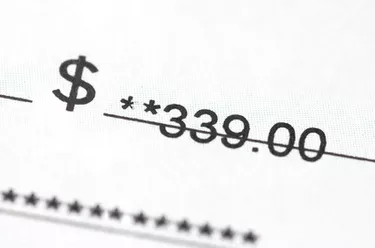
Certified checks and cashier's checks represent forms of payment guaranteed by a financial institution. A certified check is an account holder's personal check verified by a bank to have sufficient funds to cover the check amount. A cashier's check is written and signed by the bank after an account holder transfers funds to cover the amount of the check.
These official checks may be a required payment method when a large amount of money is being paid – online business transactions, down payments for real estate, legal settlements and so forth – to ensure sufficient funds for a payment.
Video of the Day
Video of the Day
What Is a Certified Check?
A certified check is a personal check written off of a checking account that the bank or credit union certifies as having enough money to cover the amount of the check without an overdraft.
Once the bank teller confirms that your bank account can cover the check, the bank will stamp your check "certified," and the funds will be frozen for the payee specified. The funds will no longer be accessible to the check writer. You'll receive a receipt for the certified check.
You must go into the bank to request a certified check. Check with your bank to see if they offer this service and for what fee.
What Is a Cashier's Check?
A cashier's check is not a personal check. It is a bank check that the bank guarantees and is drawn from the bank's funds after you transfer money from your checking or savings account for the amount of the check. A cashier's check is written by a bank employee and addressed to a specific payee. Some banks may allow an account holder to order this official check online.
Which Is Better: A Certified or a Cashier's Check?
Both types of checks are considered official payments and have some level of bank involvement that makes them more secure than personal checks. Both types of checks typically involve a bank fee for the check writer.
A cashier's check, though, is not a personal check from a payer's own account. It is an official bank check that is guaranteed by the issuer. Cashier's checks also may have watermarks included by the financial institution.
Because of this extra security, a cashier's check might be preferred by both the account holder and payee for large payments or money transfers.
Which Will Clear Faster: A Certified or a Cashier's Check?
The clearing time for both checks is generally the same: one business day. According to federal regulations, funds from a cashier's check or certified check should be made available on the first business day after the deposit was made, depending on the cutoff time for the business day of the bank where the check deposit is made.
However, some exceptions allow banks to extend deposit hold periods, and a bank must give you notice if any such exceptions apply to your transactions.
Both check payments are slower than credit card or debit card payments.
Both types of checks are considered official payments and have some level of bank involvement that makes them more secure than personal checks.
Which Is Safer?
Cashier's checks are considered the safer payment option for large purchases in many cases because the issuing bank pays the check out of its own funds. All types of checks are susceptible to check fraud, which may extend hold times. If you are accepting a payment, know how to recognize fraudulent checks and other scams so you can protect yourself and your personal finances.
Which Is Easier?
Both check types are relatively easy to get if you have enough money in your personal account to cover the check without an overdraft. However, a certified check must be created in person at the bank, while some banks allow account holders to order a cashier's check online.
In terms of ease, you also have to consider which payment option is easier to replace if lost or stolen. In both cases, it is difficult to stop payment on the check and getting a replacement check can be a long and complicated process. In case of loss or theft, notify the issuing bank immediately.
Which Costs Less?
Depending on your bank and the type of bank account, one official payment option may cost less than the other. The fee for either a cashier's or certified check is likely under $20 and may be waived with certain account types.
Certified Checks vs. Cashier's Check
Certified Check | Cashier's Check | |
|---|---|---|
Who writes it | Account holder | Bank |
Where funds are drawn from | Personal bank account | Bank's account |
Guaranteed by | Individual making payment | Issuing bank |
Security features | Bank stamp/certification that funds are available | Check written, signed and guaranteed by bank |
Cost | May have a fee of up to $20 | May have a fee of up to $20 |
Where to get one | In-person only | In-person or online |
Difficulty to stop payment or replace | High | High |
- Credit Today: Certified Check or Cashier's Check -- Which is Better for You?
- Office of the Comptroller of the Currency: Help Topics
- Code of Federal Regulations: Title 12
- Federal Trade Commission: How To Spot, Avoid, and Report Fake Check Scams
- Capital One: Order a Cashier’s Check
- Office of the Comptroller of the Currency: Funds Availability